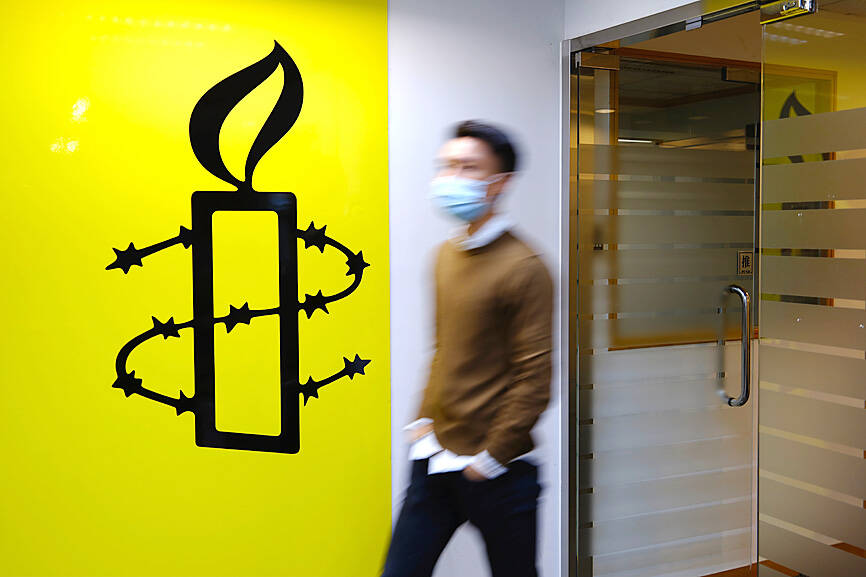Amnesty International yesterday relaunched its Hong Kong branch “in exile,” more than three years after the rights group quit the Chinese territory citing risks from a sweeping national security law.
Beijing has remolded Hong Kong in its authoritarian image after huge and sometimes violent democracy protests in 2019, imposing a security law that criminalized subversion, secession, terrorism and foreign collusion.
The international non-governmental organization closed its two offices in Hong Kong in 2021, saying at the time that Hong Kong’s National Security Law “made it effectively impossible” for rights groups to work freely.

Photo: AP
Amnesty secretary-general Agnes Callamard said that its new section “demonstrates the resilience of our movement, our determination never to be silenced and our commitment to defending human rights no matter the challenges we face.”
The branch, which is officially registered in Switzerland, said it is the first to be “founded and operated entirely ‘in exile’” and would be led by Hong Kong diaspora activists in Taiwan, Australia, Canada, the UK and the US.
Fernando Cheung (張超雄), a former Hong Kong lawmaker who joined as a board member, said top priorities include raising awareness on “prisoners of conscience” and transnational repression.
“It is clear that Hong Kong’s human rights situation has continued to worsen,” Cheung said, citing the jailing of a social worker last week over a police-protester clash in 2019.
“Being abroad, we have more latitude to speak up and connect with other international groups, as well as to conduct research and respond to events,” he added.
As of this month, Hong Kong has arrested 322 people and convicted 163 of them under two security laws — one imposed by Beijing and a homegrown one enacted last year.
Police have also issued bounties on 19 overseas democracy activists.
One of them, Joey Siu (邵嵐), said she hoped the Amnesty office can “encourage Hong Kongers living in the city or abroad in a difficult time,” adding that it was a “gesture of courage in response to repression.”

The first global hotel Keys Selection by the Michelin Guide includes four hotels in Taiwan, Michelin announced yesterday. All four received the “Michelin One Key,” indicating guests are to experience a “very special stay” at any of the locations as the establishments are “a true gem with personality. Service always goes the extra mile, and the hotel provides much more than others in its price range.” Of the four hotels, three are located in Taipei and one in Taichung. In Taipei, the One Key accolades were awarded to the Capella Taipei, Kimpton Da An Taipei and Mandarin Oriental Taipei. Capella Taipei was described by

EVA Airways today confirmed the death of a flight attendant on Saturday upon their return to Taiwan and said an internal investigation has been launched, as criticism mounted over a social media post accusing the airline of failing to offer sufficient employee protections. According to the post, the flight attendant complained of feeling sick on board a flight, but was unable to take sick leave or access medical care. The crew member allegedly did not receive assistance from the chief purser, who failed to heed their requests for medical attention or call an ambulance once the flight landed, the post said. As sick

The Taichung District Court yesterday confirmed its final ruling that the marriage between teenage heir Lai (賴) and a man surnamed Hsia (夏) was legally invalid, preventing Hsia from inheriting Lai’s NT$500 million (US$16.37 million) estate. The court confirmed that Hsia chose not to appeal the civil judgement after the court handed down its ruling in June, making the decision final. In the June ruling, the court said that Lai, 18, and Hsia, 26, showed “no mutual admiration before the marriage” and that their interactions were “distant and unfamiliar.” The judge concluded that the couple lacked the “true intention of

A drunk woman was sexually assaulted inside a crowded concourse of Taipei Railway Station on Thursday last week before a foreign tourist notified police, leading to calls for better education on bystander intervention and review of security infrastructure. The man, surnamed Chiu (邱), was taken into custody on charges of sexual assault, taking advantage of the woman’s condition and public indecency. Police discovered that Chiu was a fugitive with prior convictions for vehicle theft. He has been taken into custody and is to complete his unserved six-month sentence, police said. On Thursday last week, Chiu was seen wearing a white